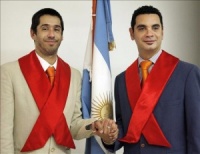Lots has been brewing in the Western Hemisphere _ Chile, Argentina and Cuba have all been wrestling with teh Catholic Church in recent weeks. A quick recap of what’s been happening in Latin America:
Argentina decided to legalize same-sex marriage, an act that went against Catholic Church lobbying (picture, lop left). After debates that kept delegates in their chambers until the early hours of the morning, Argentina became the first Latin American nation to extend equal rights of marriage to same-sex couples. From the LA Times:
The 4:05 a.m. vote came after an exhaustive debate that dragged on for more than 14 hours. Hundreds of supporters of the law, waiting outside Congress in freezing temperatures, erupted in cheers and tears of joy when news of the vote reached them.
“This was already a victory because there was no one in Argentina who wasn’t following this debate,” said Emelina Alonso, a human rights lawyer who joined the crowd to support the law. “Human rights and international law oblige us to protect [same-sex] marriage – so it is in Argentina and soon, surely, in other countries in the region.”
There are some who see Argentina’s actions as evidence of a waning Catholic presence (and power) in Latin America. As Reuters said:
“Evidently the Church has been losing presence and influence regarding political decisions, which is part of a secularization process,” said Ana Maria Bidegain, a religious studies professor at Florida International University.
“People are still Catholic and they still believe in the fundamentals … but they no longer agree with what (the Church) says regarding morality,” she said.
There’s also Cuba, whose release of 52 political prisoners was spawned by work by the Catholic Church and other human rights groups.
The Roman Catholic Church said in a statement that five of the 52 political prisoners would be freed within hours and would travel to Spain, accompanied by their relatives. Whether they were forced into exile or chose to leave is not known.
The remaining 47 will be released in “a process that will take three or four months starting now” and “may leave the country,” according to the church. The prisoners, who include journalists, community organizers and opposition figures, were sentenced to prison terms of 20 years and more. Sanchez noted that no names had been released and that no relatives or lawyers had been notified, even the five families who were said to be leaving immediately.
Religion Dispatches had a piece by feminist theologian Mary Hunt called “Don’t Cry For Me Argentina, Cry For the Catholic Church” where she says, “the Roman Catholic Church was defeated as soundly as the political opposition on this one. Maybe it is a sign of things to come in Latin America-on abortion, for example-and around the world as the institutional church fritters away its symbolic capital.”
It seems that even Latino Catholics in the U.S. are exhibiting similar opinions, as a newly released poll by the Public Religion Research Institute said.
It’s hard not to agree with Hunt and the Reuters story that the power of the RC Church may be on hold, if not declining, especially when the New York Times reports that Chile is going to go against Catholic Church opinions to pardon prisoners who played a role in Pinochet’s “Ditry War.”
Is this an indication that the Catholic Church is losing its edge?





